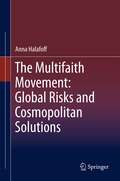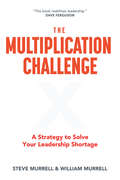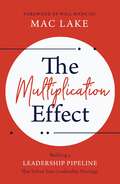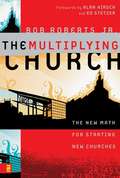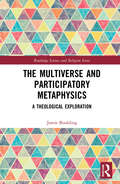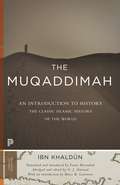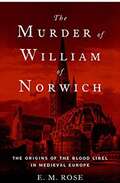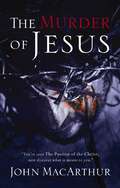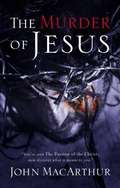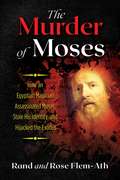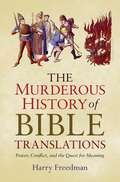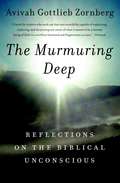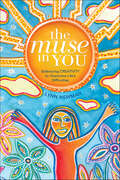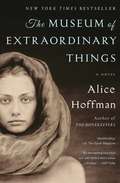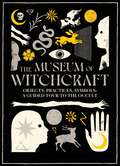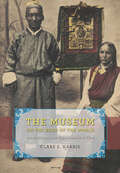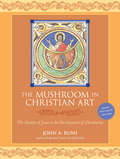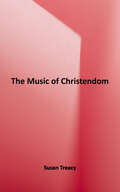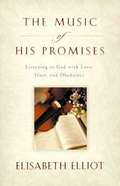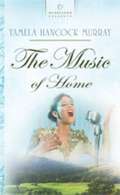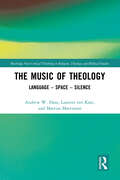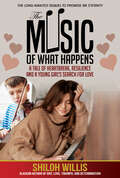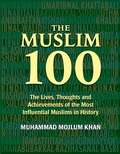- Table View
- List View
The Multifaith Movement: Global Risks and Cosmopolitan Solutions
by Anna HalafoffThis book documents the ultramodern rise of the multifaith movement, as mulitfaith initiatives have been increasingly deployed as cosmopolitan solutions to counter global risks such as terrorism and climate change at the turn of the 21st century. These projects aim to enhance common security, particularly in Western societies following the events of September 11, 2001 and the July 2005 London bombings, where multifaith engagement has been promoted as a strategy to counter violent extremism. The author draws on interviews with 56 leading figures in the field of multifaith relations, including Paul Knitter, Eboo Patel, Marcus Braybrooke, Katherine Marshall, John Voll and Krista Tippett. Identifying the principle aims of the multifaith movement, the analysis explores the benefits--and challenges--of multifaith engagement, as well as the effectiveness of multifaith initiatives in countering the process of radicalization. Building on notions of cosmopolitanism, the work proposes a new theoretical framework termed 'Netpeace', which recognizes the interconnectedness of global problems and their solutions. In doing so, it acknowledges the capacity of multi-actor peacebuilding networks, including religious and state actors, to address the pressing dilemmas of our times. The primary intention of the book is to assist in the formation of new models of activism and governance, founded on a 'politics of understanding' modeled by the multifaith movement.
The Multiplication Challenge: A Strategy to Solve Your Leadership Shortage
by Steve Murrell William MurrellWhere do I find more leaders? Every leader of a growing organization asks this question. And though we know we need more leaders, few of us know how to create a culture of leadership development. This book recounts how Steve Murrell and Every Nation rediscovered four leadership multipliers that solved the leadership shortage of a growing church and global mission organization. The principles and stories in these pages will help you identify leaders, develop current leaders, and multiply future leaders!
The Multiplication Effect: Building a Leadership Pipeline that Solves Your Leadership Shortage
by Mac LakeMost pastors say that the need to identify and develop leaders is critical to the health and growth of their church. Yet, most churches do not have an intentional plan for doing this. In this book, Mac Lake reveals a practical strategy for addressing this problem.How do you develop leaders in a church setting—good leaders, qualified leaders, leaders who are committed, who possess the DNA of the church, and leaders who produce results? The majority of churches have tried everything, but is what they are doing working? Unfortunately, in most cases, no. The Multiplication Effect is a proven, tested program, designed using unique training modules to help identify potential leaders, equip and disciple them at every level of their leadership journey, and empower them to multiply themselves by developing other leaders. Churches who use this plan will become &“cultures&” of leader development built into the structure and mission statement of the church and thus solve their leadership shortage.
The Multiplying Church: The New Math for Starting New Churches
by Bob Roberts JR.This is a must-read for pastors and lay leaders involved in, or wanting to learn about, the church multiplication groundswell in North America. It shows how multiplying churches should be a natural, regular function in the DNA of every church. Learn the principles from master multiplier Bob Roberts. Here is powerful hope for the church in America.
The Multiverse and Participatory Metaphysics: A Theological Exploration (Routledge Science and Religion Series)
by Jamie BouldingThis book offers a new theological approach to the multiverse hypothesis. With a distinctive methodology, it shows that participatory metaphysics from ancient and medieval sources represents a fertile theological ground on which to grapple with contemporary ideas of the multiverse. There are three key thinkers and themes discussed in the book: Plato and cosmic multiplicity, Aquinas and cosmic diversity, and Nicholas of Cusa and cosmic infinity. Their insights are brought into interaction with a diverse range of contemporary theological, philosophical, and scientific figures to demonstrate that a participatory account of the relationship between God and creation leads to a greater continuity between theology and the multiverse proposal in modern cosmology. This is in contrast to existing work on the subject, which often assumes that the two are in conflict. By offering a fresh way to engage theologically with multiverse theory, this book will be a unique resource for any scholar of Religion and Science, Theology, Metaphysics, and Cosmology.
The Muqaddimah: An Introduction to History - Abridged Edition (Princeton Classics #111)
by Ibn Ibn KhaldûnThe Muqaddimah, often translated as "Introduction" or "Prolegomenon," is the most important Islamic history of the premodern world. Written by the great fourteenth-century Arab scholar Ibn Khaldûn (d. 1406), this monumental work established the foundations of several fields of knowledge, including the philosophy of history, sociology, ethnography, and economics. The first complete English translation, by the eminent Islamicist and interpreter of Arabic literature Franz Rosenthal, was published in three volumes in 1958 as part of the Bollingen Series and received immediate acclaim in the United States and abroad. A one-volume abridged version of Rosenthal's masterful translation first appeared in 1969.This Princeton Classics edition of the abridged version includes Rosenthal's original introduction as well as a contemporary introduction by Bruce B. Lawrence. This volume makes available a seminal work of Islam and medieval and ancient history to twenty-first century audiences.
The Murder Of William Of Norwich: The Origins Of The Blood Libel In Medieval Europe
by E. M. RoseIn 1144, the mutilated body of William of Norwich, a young apprentice leatherworker, was found abandoned outside the city's walls. The boy bore disturbing signs of torture, and a story spread that it was a ritual murder, performed by Jews in imitation of the Crucifixion as a mockery of Christianity. The outline of William's tale eventually gained currency far beyond Norwich, and the idea that Jews engaged in ritual murder became firmly rooted in the European imagination. E.M. Rose's engaging book delves into the story of William's murder and the notorious trial that followed to uncover the origin of the ritual murder accusation - known as the "blood libel" - in western Europe in the Middle Ages. Focusing on the specific historical context - 12th-century ecclesiastical politics, the position of Jews in England, the Second Crusade, and the cult of saints - and suspensefully unraveling the facts of the case, Rose makes a powerful argument for why the Norwich Jews (and particularly one Jewish banker) were accused of killing the youth, and how the malevolent blood libel accusation managed to take hold. She also considers four "copycat" cases, in which Jews were similarly blamed for the death of young Christians, and traces the adaptations of the story over time. In the centuries after its appearance, the ritual murder accusation provoked instances of torture, death and expulsion of thousands of Jews and the extermination of hundreds of communities. Although no charge of ritual murder has withstood historical scrutiny, the concept of the blood libel is so emotionally charged and deeply rooted in cultural memory that it endures even today. Rose's groundbreaking work, driven by fascinating characters, a gripping narrative, and impressive scholarship, provides clear answers as to why the blood libel emerged when it did and how it was able to gain such widespread acceptance, laying the foundations for enduring antisemitic myths that continue to the present.
The Murder of Jesus
by John MacarthurThe pieces are in place. The curtain rises for the final act. God is about to die.An unprecedented conspiracy of injustice, cruelty, and religious and political interests sentenced a man guilty of no crimes to the most barbaric method of execution ever devised. The victim was no mere man. Jesus was God in the flesh. The Creator of life died. How did such a thing come to be? Who were the onlookers, the players, the fakes, frauds, and heroes? What was it like in the Upper Room that night, in the shadows of Gethsemane, or in the Praetorium awaiting Pilate's verdict? What is the meaning of the last words Jesus uttered as He gasped for breath on the cross? What if all the facts you now so well could come alive in your ind and heart as a living story, rather than as a 2000-year-old ancient account?By piecing together the narrative from the perspective of the participants, John MacArthur invites you to relive the most awesome injustice in the history of man, the unparalleled triumph of the sovereignty of God, and the passion of Christ.
The Murder of Jesus: A Study of How Jesus Died
by John MacarthurYou've seen The Passion of The Christ; now discover what it means to you.
The Murder of Moses: How an Egyptian Magician Assassinated Moses, Stole His Identity, and Hijacked the Exodus
by Rand Flem-Ath Rose Flem-AthAn investigation of how Moses was deceived and murdered by his father-in-law, Reuel • Shows how the magician Reuel staged the Burning Bush that spoke to Moses and assumed Moses’ identity after his murder • Explains how early scribes edited the Exodus story to cover Moses’ assassination and replacement and fabricated Moses’ origin story • Builds upon the Moses research of Goethe, Christopher Marlowe, and Sigmund Freud--who spent the last 40 years of his life obsessed with solving Moses’ murder The life of Moses, the greatest prophet of the Old Testament, has always been shrouded in mystery. The Bible mentions no witnesses to Moses’ death, no funeral, and no indication of his burial place, and the story of Exodus paints a very contradictory picture of this man so important to both Judaism and Christianity. At times, he is depicted as a meek, stuttering figure and at others his tyrannical commands and fits of rage terrorize the children of Israel. And, for the last years of his life, he chose to hide behind a veil. What is the explanation for these extreme shifts in character? Was Moses mentally ill? As Rand and Rose Flem-Ath reveal, the evidence points to something much more sinister: Moses was murdered and replaced by an impostor. The result of a decade-long investigation, this book continues and builds upon the research of Goethe, Christopher Marlowe, and Sigmund Freud--who spent the last 40 years of his life obsessed with solving Moses’ murder--and reaches a startling but well-evidenced conclusion that Moses was deceived and murdered by his father-in-law, Reuel. The authors show how Reuel was a skilled magician trained at Egypt’s prestigious House of Life and they reveal his motive: He was the son of Esau, from whom Jacob stole his birthright, the leadership of the Hebrew people, a role that Moses was now assuming. The authors explain how the magician Reuel used his sophisticated skills of manipulation and illusion to fake the Burning Bush that spoke to Moses as well as conceal his assumption of Moses’ identity after the murder. They reveal how the early scribes of the Old Testament inserted lags of time into the Exodus story to cover Moses’ assassination and replacement, fabricated Moses’ origin story, and changed the location of the “Mountain of God” from Edom, where Reuel was a prince, to Sinai. Unveiling the enigma of Moses’ real story--and his murder and replacement--the Flem-Aths dramatically challenge the time line and details of biblical history, exposing a cover-up at the very origins of Western religion.
The Murderous History of Bible Translations: Power, Conflict and the Quest for Meaning
by Harry FreedmanHarry Freedman, author ofThe Talmud: A Biography, recounts the fascinating and bloody history of the Bible. In 1535, William Tyndale, the first man to produce an English version of the Bible in print, was captured and imprisoned in Belgium. A year later he was strangled and then burned at the stake. His co-translator was also burned. In that same year the translator of the first Dutch Bible was arrested and beheaded. These were not the first, nor were they the last instances of extreme violence against Bible translators. The Murderous History of Bible Translations tells the remarkable, and bloody story of those who dared translate the word of God. The Bible has been translated far more than any other book. To our minds it is self-evident that believers can read their sacred literature in a language they understand. But the history of Bible translations is far more contentious than reason would suggest. Bible translations underlie an astonishing number of religious conflicts that have plagued the world. Harry Freedman describes brilliantly the passions and strong emotions that arise when deeply held religious convictions are threatened or undermined. He tells of the struggle for authority and orthodoxy in a world where temporal power was always subjugated to the divine, a world in which the idea of a Bible for all was so important that many were willing to give up their time, security, and even their lives.
The Murmuring Deep: Reflections on the Biblical Unconscious
by Avivah Gottlieb ZornbergFrom one of the most innovative and acclaimed biblical commentators at work today, here is a revolutionary analysis of the intersection between religion and psychoanalysis in the stories of the men and women of the Bible. For centuries scholars and rabbis have wrestled with the biblical narrative, attempting to answer the questions that arise from a plain reading of the text. In The Murmuring Deep, Avivah Zornberg informs her literary analysis of the text with concepts drawn from Freud, Winnicott, Laplanche, and other psychoanalytic thinkers to give us a new understanding of the desires and motivations of the men and women whose stories form the basis of the Bible. Through close readings of the biblical and midrashic texts, Zornberg makes a powerful argument for the idea that the creators of the midrashic commentary, the medieval rabbinic commentators, and the Hassidic commentators were themselves on some level aware of the complex interplay between conscious and unconscious levels of experience and used this knowledge in their interpretations. In her analysis of the stories of Adam and Eve, Noah, Jonah, Abraham, Rebecca, Isaac, Joseph and his brothers, Ruth, and Esther-how they communicated with the world around them, with God, and with the various parts of their selves-Zornberg offers fascinating insights into the interaction between consciousness and unconsciousness. In discussing why God has to "seduce" Adam into entering the Garden of Eden or why Jonah thinks he can hide from God by getting on a ship, Zornberg enhances our appreciation of the Bible as the foundational text in our quest to understand what it means to be human.From the Hardcover edition.
The Muse in You: Embracing Creativity to Overcome Life's Difficulties
by Lynn NewmanEverything we do is creative: the way we think, the way we problem solve, the way we make the most of our lives. But when we experience challenging times, difficult life transitions, or grief from a loss, it’s easy for creativity to vanish and disquiet to settle in. In this guidebook to your emotional health, creativity expert Lynn Newman sends a powerful message: it is possible for you to remake your life into something extraordinary. Through personal stories, exercises, meditations, and inspired questions, learn to create a life on purpose by transcending conflict to find peace and happiness, unleashing the truest parts of yourself to experience more passion and ease, enjoying more fulfilling relationships, and following curiosity to jumpstart your creative journey. If you’re ready to shine more brightly, these lessons are your loving reminders that you are a creative being ready to accomplish your dreams! There is a muse in you!
The Museum of Extraordinary Things: A Novel
by Alice HoffmanThe &“spellbinding&” (People, 4 stars), New York Times bestseller from the author of The Dovekeepers: an extraordinary novel about an electric and impassioned love affair—&“an enchanting love story rich with history and a sense of place&” (USA TODAY).Coralie Sardie is the daughter of the sinister impresario behind The Museum of Extraordinary Things, a Coney Island freak show that thrills the masses. An exceptional swimmer, Coralie appears as the Mermaid in her father’s “museum,” alongside performers like the Wolfman and the Butterfly Girl. One night Coralie stumbles upon a striking young man taking pictures of moonlit trees in the woods off the Hudson River. The dashing photographer is Eddie Cohen, a Russian immigrant who has run away from his community and his job as a tailor’s apprentice. When Eddie photographs the infamous Triangle Shirtwaist Factory fire, he becomes embroiled in the mystery behind a young woman’s disappearance. And he ignites the heart of Coralie. Alice Hoffman weaves her trademark magic, romance, and masterful storytelling to unite Coralie and Eddie in a tender and moving story of young love in tumultuous times. The Museum of Extraordinary Things is, “a lavish tale about strange yet sympathetic people” (The New York Times Book Review).
The Museum of Witchcraft
by Diane PurkissEvery sense is tingling. Strange symbols loom out of the darkness, and incantations whisper through the air. It's cold and quiet, so why don't you feel completely alone? Welcome to The Museum of Witchcraft, a collection of 100 artefacts where a history of secret wisdom, female power and occult objects comes to life. Wander through its pages to discover why cooking is magic, which trees are most enchanted, how to create an amulet, where to find a witch mark and why bad weather could have you burned at the stake.With each page a beautiful display cabinet containing esoteric illustration and authoritative text, it's time to discover the shadowy world of witches.
The Museum of Witchcraft
by Diane PurkissEvery sense is tingling. Strange symbols loom out of the darkness, and incantations whisper through the air. It's cold and quiet, so why don't you feel completely alone? Welcome to The Museum of Witchcraft, a collection of 100 artefacts where a history of secret wisdom, female power and occult objects comes to life. Wander through its pages to discover why cooking is magic, which trees are most enchanted, how to create an amulet, where to find a witch mark and why bad weather could have you burned at the stake.With each page a beautiful display cabinet containing esoteric illustration and authoritative text, it's time to discover the shadowy world of witches.
The Museum on the Roof of the World: Art, Politics, and the Representation of Tibet (Buddhism And Modernity Ser.)
by Clare E. HarrisFor millions of people around the world, Tibet is a domain of undisturbed tradition, the Dalai Lama a spiritual guide. By contrast, the Tibet Museum opened in Lhasa by the Chinese in 1999 was designed to reclassify Tibetan objects as cultural relics and the Dalai Lama as obsolete. Suggesting that both these views are suspect, Clare E. Harris argues in The Museum on the Roof of the World that for the past one hundred and fifty years, British and Chinese collectors and curators have tried to convert Tibet itself into a museum, an image some Tibetans have begun to contest. This book is a powerful account of the museums created by, for, or on behalf of Tibetans and the nationalist agendas that have played out in them. Harris begins with the British public’s first encounter with Tibetan culture in 1854. She then examines the role of imperial collectors and photographers in representations of the region and visits competing museums of Tibet in India and Lhasa. Drawing on fieldwork in Tibetan communities, she also documents the activities of contemporary Tibetan artists as they try to displace the utopian visions of their country prevalent in the West, as well as the negative assessments of their heritage common in China. Illustrated with many previously unpublished images, this book addresses the pressing question of who has the right to represent Tibet in museums and beyond.
The Mushroom in Christian Art: The Identity of Jesus in the Development of Christianity
by John Rush Martin W. BallIn The Mushroom in Christian Art, author John A. Rush uses an artistic motif to define the nature of Christian art, establish the identity of Jesus, and expose the motive for his murder. Covering Christian art from 200 CE (common era) to the present, the author reveals that Jesus, the Teacher of Righteousness mentioned in the Dead Sea Scrolls, is a personification of the Holy Mushroom, Amanita muscaria. The mushroom, Rush argues, symbolizes numerous mind-altering substances—psychoactive mushrooms, cannabis, henbane, and mandrake—used by the early, more experimentally minded Christian sects.Drawing on primary historical sources, Rush traces the history—and face—of Jesus as being constructed and codified only after 325 CE. The author relates Jesus’s life to a mushroom typology, discovering its presence, disguised, in early Christian art. In the process, he reveals the ritual nature of the original Christian cults, rites, and rituals, including mushroom use. The book authoritatively uncovers Jesus’s message of peace, love, and spiritual growth and proposes his murder as a conspiracy by powerful reactionary forces who would replace that message with the oppressive religious-political system that endures to this day. Rush’s use of the mushroom motif as a springboard for challenging mainstream views of Western religious history is both provocative and persuasive.The package includes an informative DVD with 252 striking color images depicting Christian art, with key motifs indicated by the author.
The Music of Christendom: A History
by Susan TreacyMusic plays such an important part in everyone's life but how much do we know about the history of music? How did music shape our civilization and how was music itself shaped by the Catholic Church? Susan Treacy, an experienced professor of music, is an excellent guide to the history of music. Every Catholic should own at least one book on music. This is it.
The Music of His Promises: Listening to God with Love, Trust, and Obedience
by Elisabeth ElliotWhether you can take what life dishes out depends on what you take first. If you take from the grace of God the strength offered, you will find it absolutely sufficient to cover any need. You will find yourself quite amazingly able to bear the hardship of life's bitter battle as a good soldier. But the soldier has to be trained, prepared, and equipped first. Don TT rush into the fray and try to 'take it' without first taking strength." Take strength from these reminders of the loving sovereignty of the God who has called us His own. Bracing and calming at the same time, The Music of His Promises-fresh thoughts from the pen of Elisabeth Elliot-will soothe your soul and give you strength.
The Music of Home
by Tamela Hancock MurrayContent with where life finds her, Drusie happily plans her future with Gladdie, her handsome fiance. Gladdie has a dream to own the store he works in, but money is hard to come by in Sunshine Holler, North Carolina. And then Gladdie's cousin, a successful record producer, hears Drusie sing and offers her the chance of a lifetime. Gladdie doesn't know what to think when Drusie and her sister head to the city to make a record and go on tour. Drusie says she's only doing this to help him buy that store. But what will happen when she hits the big time-and when other men start to appreciate his girl? Can their homespun romance survive a tangle with the glamor and excitement of city life and show business? Or will the underside of that business tear them apart?
The Music of Theology: Language – Space – Silence (Routledge New Critical Thinking in Religion, Theology and Biblical Studies)
by Andrew Hass Mattias Martinson Laurens ten KateThis book reconceives theology as a musical endeavour in critical tension with language, space and silence. An Overture first moves us from music to religion, and then from theology back to music – a circularity that, drawing upon history, sociology, phenomenology, and philosophy, disclaims any theology of music and instead pursues the music in theology. The chapters that follow explore the three central themes by way of theory, music and myth: Adorno, Benjamin and Deleuze (language), Derrida, Rosa and Nancy (space), Schelling/Hegel, Homer and Cage (silence). In overdubbing each other, these chapters work towards theology as a sonorous rhythm between loss and freedom. A Coda provides three brief musical examples – Thomas Tallis, György Ligeti, and Evan Parker – as manifestations of this rhythm, to show in summary how music becomes the very pulse of theology, and theology the very intuition of music. The authors offer an interdisciplinary engagement addressing fundamental questions of the self and the other, of humanity and the divine, in a deconstruction of modern culture and of its bias towards the eye over the ear. The book harmonizes three scholarly voices who attempt to find where the resonance of our Western conceptions and practice, musically and theologically, might resound anew as a more expansive music of theology.
The Music of What Happens: A Tale of Heartbreak, Resilience, and a Young Girl's Search For Love
by Shiloh WillisThirteen-year-old Celina Zagoradniy-Montoya dreams of a different life; a life where her beloved father is alive again, where there's enough food and medicine for her sick brother, and where Mama doesn't have to work so hard. But when an answer to her impoverished family's prayers arrives in a form Celina did not anticipate and doesn't want, the conflicted young girl soon finds herself on a journey of self-discovery, a journey that leads her down a path wrought with fear, pain, and mistrust. Then, just as she is beginning to accept her new life, a stranger from the past appears and reveals the shocking secret Celina's mother has kept for years, a secret that will test Celina's faith and force her to question all she holds dear and leave her changed forever.
The Muslim 100
by Muhammad Mojlum Khan"It is rare to see a publication which includes personalities from both Shia and Sunni schools of thought and which is so much needed in today's turbulent world. This book, I believe will . . . enrich our understanding of not only the historical but the contemporary history of the Muslim."--Ahmed J. Versi, chief editor of The Muslim News (London)Who have been the Muslim world's most influential people? What were their ideas, thoughts, and achievements? In one hundred short and engaging profiles of these extraordinary people, fourteen hundred years of the vast and rich history of the Muslim world is unfolded. For anyone interested in getting an intimate view of Islam through its kings and scholars, generals and sportsmen, architects and scientists, and many others--this is the book for you.Among those profiled are the Prophet Muhammad, the Caliph Umar, Imam Husain, Abu Hanifa, Harun al-Rashid, al-Khwarizmi, al-Ghazali, Saladin, Rumi, Ibn Battuta, Sinan, Ataturk, Iqbal, Jinnah, Ayatollah Khomeini, Malcolm X, and Muhammad Ali.
